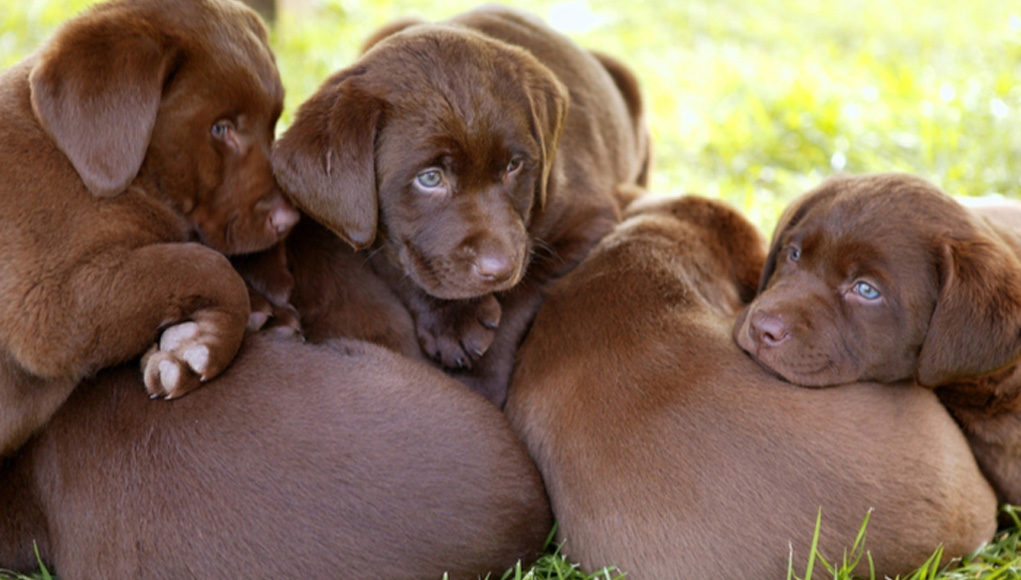Table of Contents
- So, What is the Right Age for Dog Litter Separation?
- Why Do Puppies Need to Stay With Their Littermates At This Age?
- Potential Consequences of Early Dog Litter Separation
- Do Puppies Miss Their Littermates?
- What to Expect After Dog Litter Separation
- Tips on How to Handle Dog Litter Separation and Anxiety
- How To Handle Those Who Went Through Dog Litter Separation Too Soon
- Frequently Asked Questions About Dog Litter Separation
- Should you separate littermates?
- How do you separate a mother dog from her puppies?
- Do dogs know their siblings after being separated?
- How long does it take for a puppy to forget its mother?
- Is it a good idea to get two puppies from the same litter?
- Do dogs get sad when separated?
- When do puppies leave their mother?
- Final Takeaways About Dog Litter Separation
Did you know that separating a puppy from his litter at the age of 30 weeks below can increase the risk of developing aggressive behaviors?
If you're planning to adopt a puppy, you need to know that dog litter separation can be challenging, just as human separation.
So, when is the right time to separate your little doggo from his mother and siblings?
If you're curious about that, you came to the right place!
In this article, we'll discuss:
- The proper timeline you should follow to ensure a smooth transition of your puppies to their new home
- Potential negative consequences of too separating puppies from their litter too early
- 7 simple tips and tricks on how to handle puppies suffering from litter separation
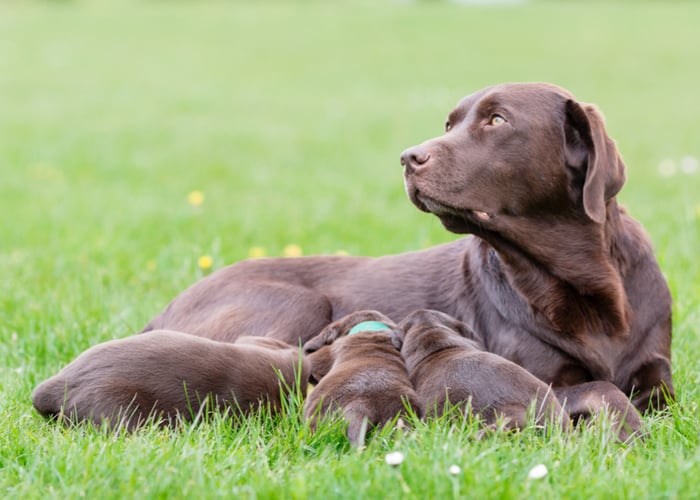
So, What is the Right Age for Dog Litter Separation?
Most responsible breeders and experts advise you to wait until the puppy is eight weeks old before carrying out a dog litter separation.
Your puppies are dependent on their mothers and need to be with their siblings for at least eight weeks and spend time with them.
It's a common practice to separate a dog from the litter when they're 6 to 8 weeks old. But learning social skills takes time, and it can last for around 6 to 12 weeks.
So, others wait until the pup is 10 to 12 weeks before bringing home their pup.
But you may wonder why puppies must stay with their siblings and mother when they're below eight weeks old.
So, let's dig into that!
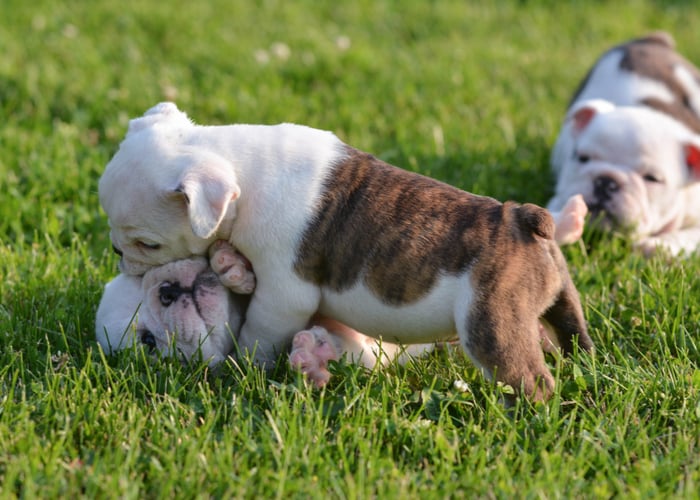
Why Do Puppies Need to Stay With Their Littermates At This Age?
These adorable creatures need to grow up along with their littermates and mothers for at least eight weeks to:
Get food from his mom
Puppies depend on their mom for food, love, and protection, just like a human child. So they must stay with their mom even if that means sometimes they have to fight with their siblings for milk.
Your pup will also learn social skills by playing with his siblings and mother during their third to the eighth week.
At this point, he'll try to explore the world around him and realizes where he fits in the pack.
Get a grasp of canine communication
At three to six weeks, puppies learn about body postures and canine communication through play.
Learn bite inhibition
Puppies learn the concept of bite inhibition through play. When they bite too hard on their opponent, usually his sibling, the other will cry or make a sharp yelp, which may lead to withdrawal from play.
So, the puppy learns he needs to control his bite and the pressure he places to continue playing.
Be taught about basic manners
Through the help of the mother dog, puppies can learn submissiveness by the age of 5 weeks.
Mothers teach their puppies some basic manners and discipline their kids when they behave differently by growling, snapping, or snarling.
The tiny pups will gradually learn the lessons after a few corrections. And over time, it'll only take a mere glare from the mothers for the puppies to get the point across.
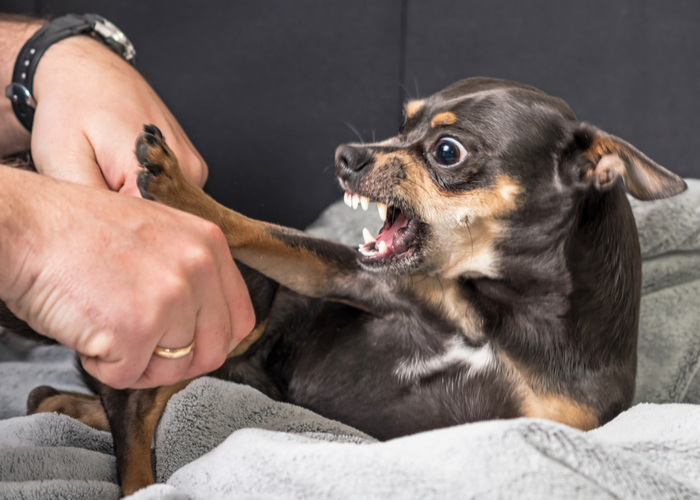
Potential Consequences of Early Dog Litter Separation
Not following the proper timeline for dog litter separation can have negative effects not just on their physical health but also on their mental and social skills.
- Your puppy may suffer from the poor physical condition and increased disease susceptibility.
- Puppy separation anxiety from mother may also occur and that can hinder the transition. There's also a high risk of mother dog depression after puppies leave, especially when their kids are below 8 weeks.
- You may also notice decreased weight gain induced by puppy separation anxiety from litter.
- If he cannot learn about appropriate bite inhibition, he might hurt other dogs even when he's just goofing around. Furthermore, he may also hurt you unintentionally.
- Separating him from his littermates too soon may decrease his learning ability too.
- They can be difficult to train if they don't learn discipline from their mothers.
- A study in Italy regarding dog's early separation from litter also revealed that most dogs who were separated from the litter too early showed the following behavioral problems more than the dogs separated at 60 days:
- toy possessiveness
- fearfulness on walks
- aversion to strangers
- excessive barking
- attention-seeking
- destructiveness
- reactivity to noise
- and play biting
But did you know that weaning puppies too early can harm their mother's health too?
Dr. David W. Reinhard (Nationwide pet insurance's consulting veterinarian) states that “abrupt weaning can cause mammary gland congestion, especially if the dog litter is large. And it can be painful and lead to mastitis or mammary gland inflammation.”
Therefore, weaning should be a gradual process. You have to ensure the nursing frequency and supplementing of the puppy's diets will be reduced slowly.
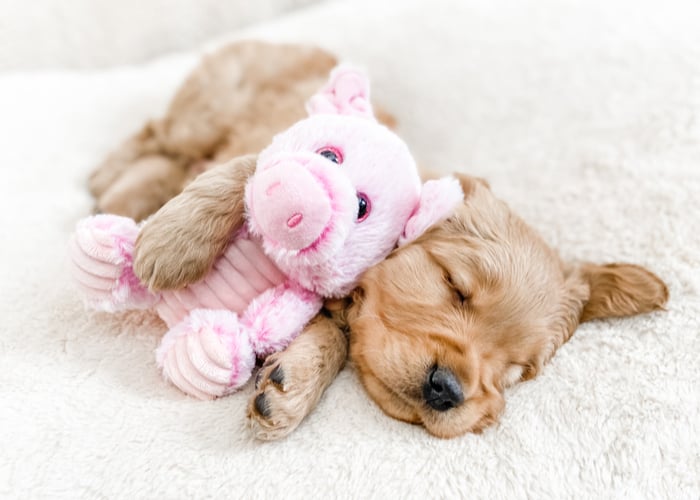
Do Puppies Miss Their Littermates?
You may probably wonder about the question “do puppies miss their siblings” since humans do.
It's hard to answer this question since some experts don't believe puppies will miss their littermates. But they may miss their playmates, although they probably won't recognize them when they meet later in life.
However, since puppies spend at least the first eight or nine weeks of their lives with their littermates, adjusting to their new environment can be challenging.
Your pup may feel stressed or anxious during the transition. Others may even cry or whine, and it's normal.
But by showering your pup with lots of love and tender care, transitioning will be smoother, and any sign that they miss their littermates will soon be gone.
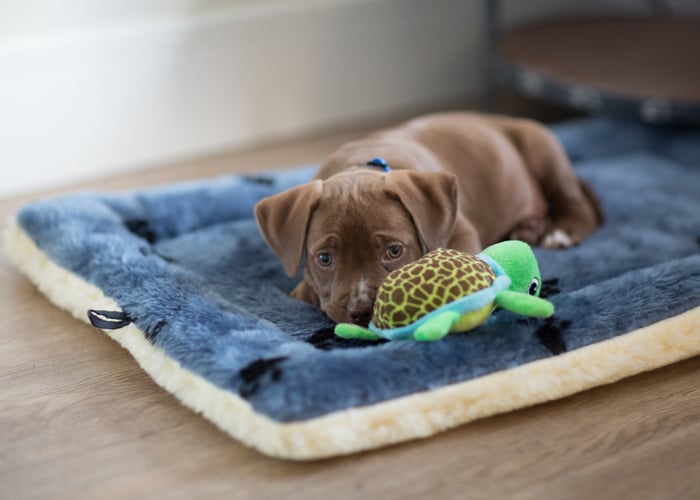
What to Expect After Dog Litter Separation
Separating littermates is surely not easy! When your puppy gets separated from his mother and siblings, he may exhibit the following behavior.
- He might cry when he's alone, or you're out of sight and follow you around wherever you go.
- You can also expect a barking or crying session if you'd put him inside his crate.
- He might also get frightened easily by loud noises such as vacuum cleaners, doorbells, or raised voices.
- Your puppy may also want you to hold him constantly to feel safe and protected.
- He may also be restless or have trouble falling asleep at night.
These behaviors are normal when they're brought to a new place with new people, sounds, smells, and sights.
But by discovering how they may act, you can understand and handle them much easier and help them adjust and transition into their new home.
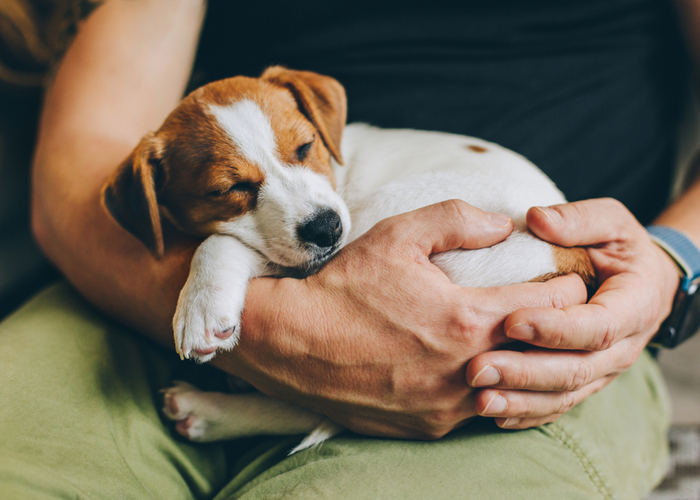
Tips on How to Handle Dog Litter Separation and Anxiety
Now how should you prepare your puppy for litter separation and how should you deal with the consequences of separating him from his siblings?
Here are before and after tips that can help you get through this process and comfort for little one:
Before the Dog Litter Separation
1. Let him enjoy his time with his littermates
Since the first few weeks of their lives are crucial, it's best to let him enjoy being with his family and learning from his littermates.
Soon, you'll have to fill their shoe and act as a parent and sibling in one, so you have to be prepared too.
2. Reduce their dependence on their mom and siblings
You can carry this out by introducing a pan and letting him eat in it. Doing so will make them less reliant on their mother for food.
It'd help if you'd gradually separate your chosen pup from his littermates for an hour every day.
This technique will help you bond with them and distract them.
After Dog Litter Separation
1. Keep your home free from loud noise
Since your pup is sensitive to loud noise, you must ensure his new environment is calm and peaceful.
2. Bring something from the litter
Pups are scent-oriented. So if possible, bring a blanket or toy that smells like their family or a fresh blanket when you pick up your new puppy and ask if you can rub it on the dam.
Your dog will feel more at ease in their new home if they have this blanket, which has a pleasant aroma.
To add another scent source, you can ask the breeder for a toy your puppy's mother and siblings have used. Once your puppy is home, put the scented blanket inside or on top of the kennel.
3. Make him feel safe using a ticking clock
This old-fashioned way of putting a ticking clock near your pup's crate is effective because the sound simulates their mom's heartbeat.
4. Place his crate somewhere near you
Most puppies feel secure and protected when they're close to you, their new parent. So, many owners place their dog's crate inside their bedroom so they won't feel isolated or alone.
Puppies also find comfort when they hear your voice or someone's petting them. But you must expect some whining and barking before they feel comfortable inside your room and settle down.
5. Create a routine
Dogs enjoy having a routine, and it'll help ease the transition. So, try to have a consistent feeding, walking, and potty break schedule.
And, of course, don't forget to incorporate playtime into your routine.
6. Socialize with your pup
As we said earlier, you'll become the puppy's new parent once they leave their pack. So, he may become needy of attention and contact from you.
Playtime can also help distract them while providing mental and physical stimulation. So try using stimulating dog toys that do not pose a choking hazard.
Taking your little one to your family's or your friend's house and introducing him to other dogs can greatly help to develop his social skills.
7. Get a hot water bottle wrapped in a blanket
If the previous methods still don't work, we recommend this time-tested technique that helps settle down puppies.
Try wrapping a hot water bottle with a blanket or soft towel. They put it inside their crate to feel the heat, just like when they're with their mother and littermates.
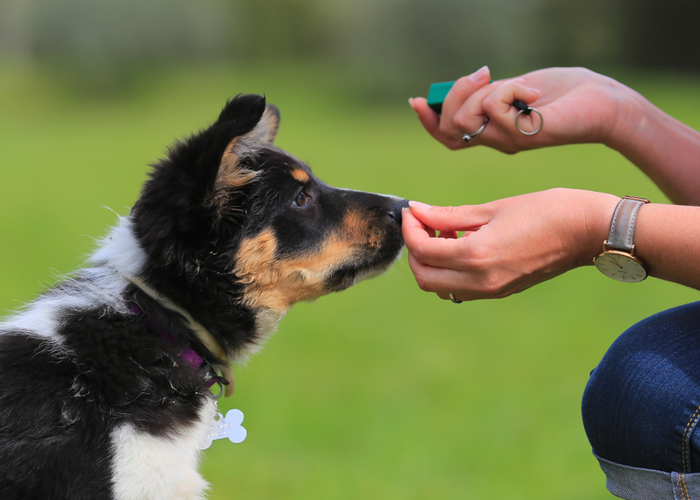
How To Handle Those Who Went Through Dog Litter Separation Too Soon
Puppies who lack discipline because they got separated too soon from their littermates and mom can still be managed.
However, you may need to invest in getting help from a dog trainer who can evaluate if your pup is suitable for puppy classes.
It can help your puppy learn the basic canine etiquette practices and the importance of controlling himself even when playing. It's best to do the training when the puppy is small (not more than 80 pounds) because he can become a liability once he's grown up.
Establishing leadership is crucial to teaching your pup to respect your authority as an owner and provider.
It'd help if he'd also go through the “nothing in life is free” program, implying the importance of listening to his owner to earn some privileges. For example, he needs to sit before he gets his food.
This training will establish leadership and strengthen your bond with your pup.
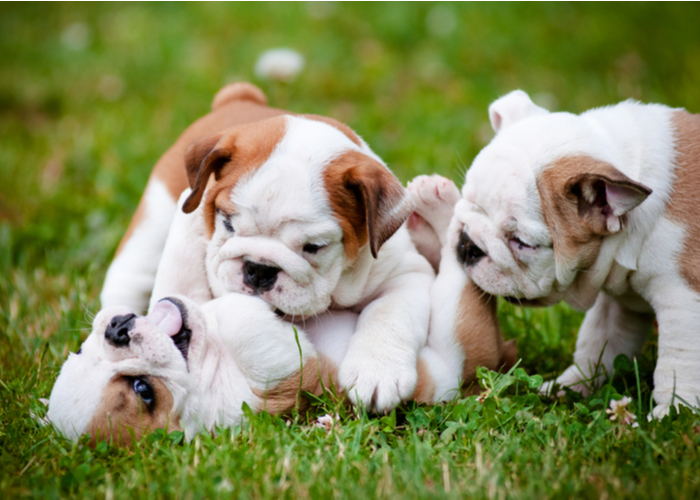
Frequently Asked Questions About Dog Litter Separation
Should you separate littermates?
Dr. Ian Dunbar, a veterinarian and dog behaviorist, agrees that it's best to separate littermates so that each of them can generally develop as an individual.
Raising littermates together is challenging because they can be dependent on each other. And it'll make it hard for you to bond with them because they're too busy with each other.
How do you separate a mother dog from her puppies?
You should start the weaning process gradually by separating the puppies from their mom for a few hours at a time. And when they're not together, try encouraging him to eat in a pan to lessen their dependence on their mother's milk and presence.
Do dogs know their siblings after being separated?
Dogs can remember their littermates and parents if they're together during their socialization phase, which is the week 3-16 of their life.
They may recognize their sibling's scent and be a little more excited, kiss, or play in a rough way when they realize it's their brother or sister.
How long does it take for a puppy to forget its mother?
After eight weeks of life, puppies may become independent of their mom, and most mother dogs wean their babies at this age.
However, your pup may still recognize his mom in the future using scent-mediated kin recognition. And mother dogs may also identify their puppies after being separated.
Is it a good idea to get two puppies from the same litter?
Most training professionals don't recommend adopting two pups simultaneously because they can get too close and become inseparable.
As a result, they may refuse to bond or interact with their humans since their sibling is enough for them.
It can result in littermate syndrome and make training more challenging.
Do dogs get sad when separated?
Dogs may have difficulty adjusting when separated, but it's hard to tell if they miss their siblings. However, they may develop stress and anxiety before settling down and cry and whine when they're alone.
When do puppies leave their mother?
Experts recommend waiting until the puppies are 8 weeks old before separating them from their moms.
Mother dogs have a lot of lessons to teach their little ones before bidding goodbye and puppies can learn some socialization skills from their siblings as well.
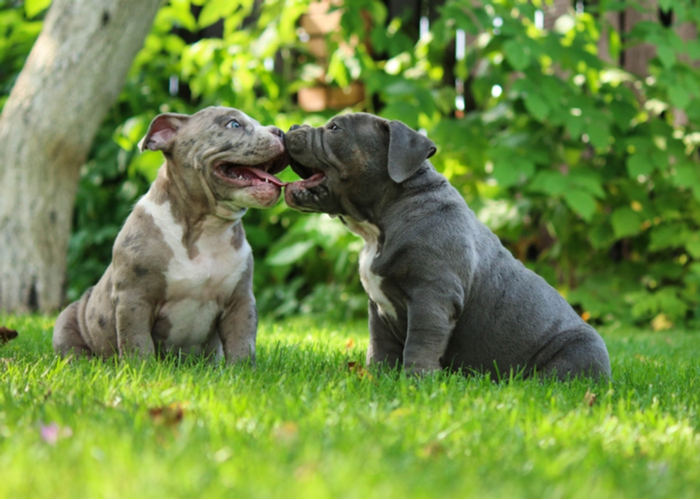
Final Takeaways About Dog Litter Separation
Dog litter separation is stressful for our furry little friends, but it's inevitable. Since you'll take over and replace their mother's role as a parent, it's your responsibility to make them feel as comfortable as possible and provide for all their needs.
The best age to separate puppies from mothers and littermates is 8 weeks old. At this age, they're already equipped with fundamental social skills, and less dependent on their mom.
By making them feel loved, cared for, and protected, separation would be less traumatic, and the risk of anxiety caused by puppy separation from litter.
And if the circumstances require you to separate your pup from the litter a little too soon, like the mother's unexpected death, it's always best to get the help of professionals.


